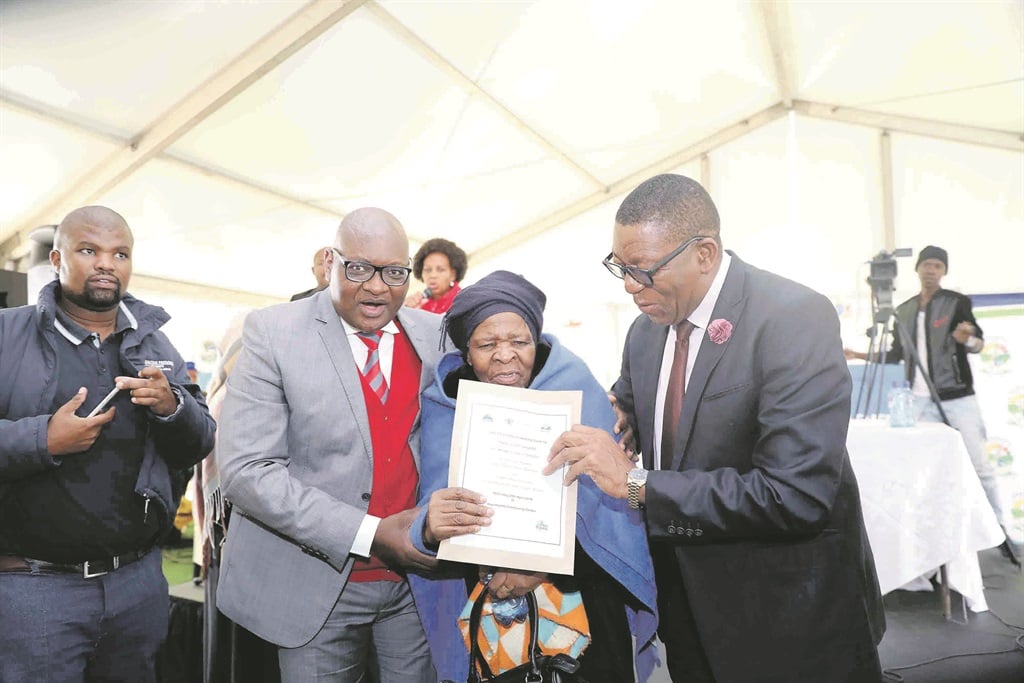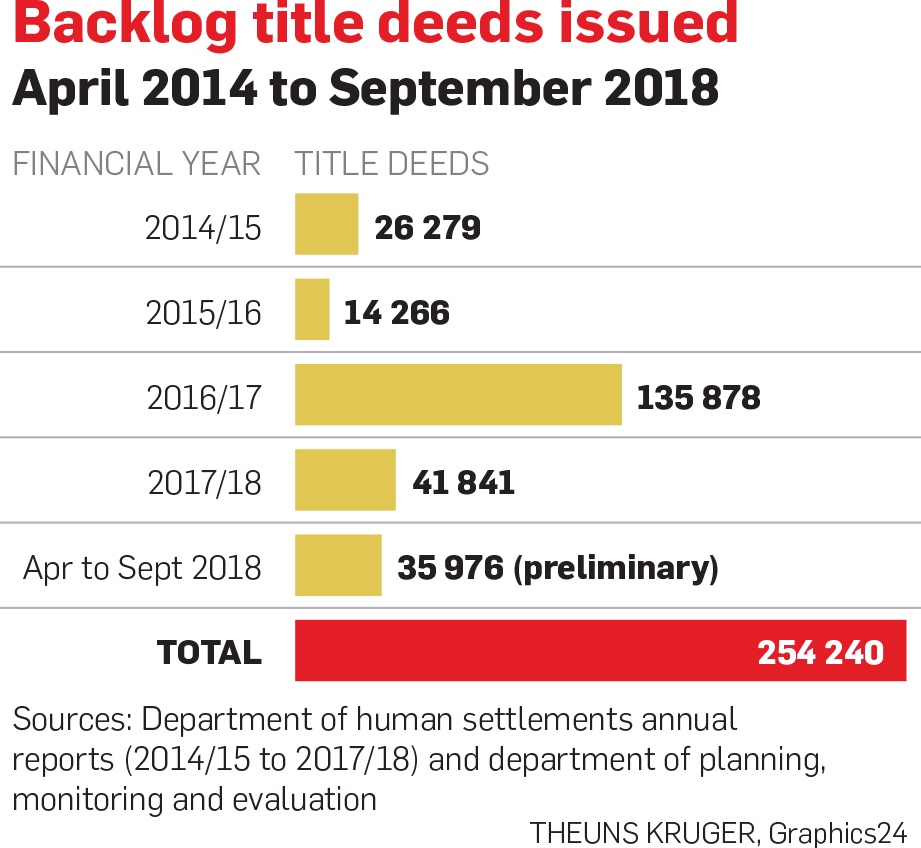
Just more than five years ago, the ANC released its 2014 election manifesto. Did the ruling party keep the promises it made then? We track a selection.
PROMISE: In the next five years, we will eliminate the backlog of title deeds
In 2014, the title deed backlog was estimated to be between 900 000 and 1.5 million.
This was updated to 818 057 in the department of human settlements’ revised strategic plan for 2015 to 2020. The backlog consisted of 83 628 title deeds from before 1994 and 734 429 post-1994 title deeds.
Dr Mark Napier, principal researcher in the built environment unit of the Council for Scientific and Industrial Research, says the pre-1994 backlog is made up of the “few remaining” old township rental houses still not transferred to ownership for the occupants. The post-1994 backlog applies to government-subsidised housing such as RDP houses.
Between April 2014 and September last year (the latest available data), 254 240 backlog title deeds were issued.
This means that 563 817 title deeds would have to be issued within six months in order to fulfil the ANC’s 2014 manifesto promise of eliminating the backlog.
READ: ANC keeps its word on new universities
Can we trust the data?
In some cases, the recorded number of title deeds issued against the backlog was amended in subsequent annual reports.
Asked about the apparent discrepancy, Hassen Mohamed, head of local government performance assessment in the department of planning, monitoring and evaluation (DPME), said the numbers might change once they were reviewed by the Auditor-General (AG). “The numbers are adjusted in the following year’s annual report if found to be under- or overstated,” said Mohamed.
“[The] DPME does not have the capacity to do the verification and relies on the department’s [human settlements] verification database as well as the AG’s and provincial reports to triangulate and check if there are any inconsistencies.”
In its 2017/18 report on national and provincial audit outcomes, the AG says the department of human settlements is one of the departments that failed to report “in a reliable manner on the performance of its programmes”.
It says the information may not have been “always gathered in a consistent manner or was not credible”. The report indicates that the reported number of backlog title deeds issued in 2017/18 was unreliable.
Why the delay?
A cause of the delay in issuing title deeds was the failure to bring sites (individual plots of land) in specific neighbourhoods to the property market for transfer, said Napier. The final step in this process is the registration of individual sites in the names of their owners in the deeds registry.
A change in the way in which government payments were made to developers exacerbated this problem, he said.
Initially, a substantial payment was held back until title deeds had been registered in the name of the beneficiaries. From 2004, final payment could be made before this had taken place – removing the financial incentive to complete the titling process.
Another contributing factor, said Napier, was that some municipalities and provinces held back title deeds because of the prohibition on selling RDP houses before eight years had passed. “By the time they wanted to issue the title deeds, they found that significant numbers of the original residents had moved, or passed away.”
Napier said things should have improved recently because the title deeds restoration project (government’s recently introduced programme to transfer the remaining title deeds to residents who still have not received these) is now a funded programme.
But at the same time, the amount of low-hanging fruit might decrease as the backlog is reduced. Now, a greater proportion of complicated cases would remain. This would include people who died without a will and cases where property was transferred informally or where ownership was disputed.
The department of human settlements did not respond to detailed questions by the time of publication. The Estate Agency Affairs Board referred an enquiry to the department.
VERDICT:
PROMISE BROKEN
Based on the pace of delivery to date and the fact that the ANC has promised to “address” the title deed backlog in its 2019 manifesto, it appears that the promise will not be fulfilled by the end of the current financial year.
NO ANC RESPONSE
Lerato Monethi, the ANC’s national elections communications manager, acknowledged receipt of a request for comment on our findings on Wednesday and said the party would “revert”. However, no response was received within the 48 hours provided. She could not be reached via WhatsApp, email, SMS or phone on Friday. When the ANC does respond, City Press and Africa Check will update the online versions of these promises to reflect the party’s comment.
- This package is part of a journalism partnership with Africa Check, the continent’s leading fact-checking organisation. The project aims to ensure that claims made by those in charge of state resources and of delivering essential services are factually correct. In the run-up to this year’s national and provincial elections, it is increasingly important that voters are able to make informed decisions. This series aims to provide voters with the tools to do that. Africa Check and City Press will be tracking more of the ANC’s promises in the run-up to the election




 Publications
Publications
 Partners
Partners









